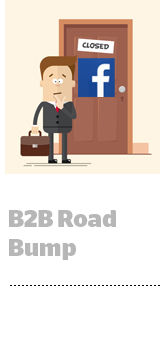
Facebook’s decision to disable segments around self-reported user information, including employers, won’t significantly change the amount of spend the platform gets from B2B marketers, according to numerous agency sources.
Facebook disabled targeting around self-reported segments after ProPublica revealed Thursday that advertisers can target users with anti-Semitic and derogatory terms. The ban includes employer and education segments, as Facebook users can list anyone under those categories without verifying their listed company or school.
But many B2B brands rely on employer-based targeting on Facebook throughout the funnel, said Brittany Richter, head of social at iProspect.
“Employer-based targeting in paid social for B2B advertisers is a critical exclusion tactic,” she said. “Facebook is where the savviest B2B marketers are spending.”
Facebook’s employer segment is important for marketers building account-based marketing (ABM) campaigns because it offers more robust information and scale than other platforms, said Ian Dahlman, VP of search and analytics at B2B agency Gyro.
“We have a significant client base that is using that [employer] targeting segment,” he said. “It may eliminate people from being able to target on Facebook, or at least achieve the goals they set out to achieve.”
But Facebook is still an effective platform for B2B marketers – B2B marketers can also segment based on job titles, business size and fields – so most agencies will continue spending on the platform.
Digital agency Neo@Ogilvy, for example, will continue to target against Facebook’s interest-based and behavioral segments to reach people in areas outside of job function or industry. It will also bring verified third-party data segments to the mix to validate Facebook segments against legitimate companies and job titles.
“When it comes to B2B specific segments, we’re going to take a step back,” said David DeStefano, supervisor of social at Neo@Ogilvy’s Social Lab. “But we’re not pausing all Facebook segments. We can easily pivot spend.”
IProspect will target people who expressed interest in employer groups and pages to find scale among its audiences in a brand-safe way, and Gyro will continue to leverage Facebook’s B2B segments, minus employers, until Facebook finds a fix.
“If we’re able to test the employer interests and employer groups, and if they are effective and have scale, I don’t see us shifting budgets,” Richter said.
For Facebook, the issue may be a quick fix. Dahlman says Facebook can monitor the issue by putting the in-question segments under a 24-hour human review period before launching them on the platform.
“If Facebook doesn’t have that structure built, they can adapt pretty quickly to be able to do that,” Dahlman said. “I wouldn’t be surprised if this gets remedied this week.”
And because Facebook offers far more targeting options, scale and ad formats than pure-play B2B platforms like LinkedIn, there really isn’t an alternative platform that will reap major benefits from Facebook’s issue.
“The interactions on LinkedIn are more forced, and on Facebook you get a more natural interaction,” Dahlman said. “When you’re at home with your kids and have your iPad open, you might still be consuming work content. On Facebook we can target those people more effectively.”
This post was syndicated from Ad Exchanger.

More Stories
Balancing Innovation, Authenticity, and Human Creativity With AI
After Record-Breaking Ad Sales, Comcast NBCU and the Olympics Team Up Again
2degrees and TBWA\NZ develop SupportHER club for women’s sport